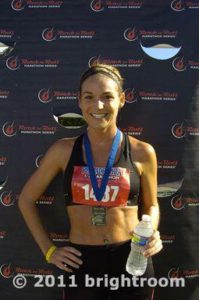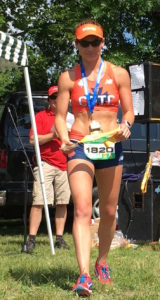
Summer 2007, going to guess 135-140lbs. I was running a little at the time, but also on diet pills, birth control, and stress eating at a theater gig.
Clothing size and the number on the scale can often torment or define the happiness of many of us. I’ve been very open about my relationships with food, body image, and an obsession at times with my size and the number on the scale. In today’s blog I’d like to discuss that number on the scale in regards to running and athletic performance, but also to address the human struggle.
I’m asked all the time about body weight and speed. It makes sense that the lighter the runner, the faster and more efficient the athlete. This is true in a lot of ways. Runners chasing down a specific time goal often look for the lightest shoe they can handle. Every step, stride, arm swing – that takes energy. When every second counts, so does every ounce. HOWEVER, athletes need to be careful to not lose too much muscle. An athlete who is under fueled and lacking good strength will be prone to injury, poor form, and can feel their training plateau because they are not fueled for training or racing. So there needs to be a safe, realistic, and honest assessment of finding that sweet spot. Extra weight isn’t good, but neither is being under weight. For my athletes, I always promote eating to support their training needs. Usually extra weight tends to disappear, but the athlete is also successfully fueled to knock those hard runs out of the park. This isn’t to say that runners always lose weight. Some can gain weight, as their appetite increases and perhaps they get a little carried away. It’s a balance. And a process.

A post-race photo in 2011. Just ran a new Half Marathon PR. My lightest weight of my adult life – 119-122lbs.
There have been times in my running career where I gained weight while training (and no, not muscle), and times where I have dropped a lot of weight. I’ve experienced the consequences of both. I’ve lost some speed when heavier. I’ve also been injury prone when lighter. It was a journey for a long time. But after my lowest weight, in 2011-2012 – about 119-123lbs., and suffering an injury, a few things changed for me. One, I started weight training in 2013. Not stupid 5lb. shit. Seriously lifting weights. This was also when I got my Personal Training and Nutrition certifications, and my view on the human body changed. But most importantly, this was when I STOPPED weighing myself every damn day. It had become an obsession. A game. Something I could control. I never starved myself to be super skinny, but I trained to lose weight, period. I trained stupid. Once I stopped training like an idiot and weighing myself, a few things changed. I gained muscle from head to toe. I had muscles in my upper body I’d never seen before. And you know what? That was fucking awesome.
Since 2013, I have been consistently (more or less – there are certainly weeks where I don’t make it to the gym!) lifting heavy. In early 2015, I added heavy lifting for my lower body. Not only have I become a much more efficient runner, my aches, pains and injuries have thankfully been almost non-existent. I hop on the scale every few months (maybe, if that?), and have been a consistent 131lbs. for the last 3 years. I’ve been proud to be 131lbs., 5’7″, and strong. I want to be an example that the number on the scale doesn’t define shit. Strength does.

June 2016, after a race. Probably weighing 128-130lbs.
One thing that has been consistent since 2011 – I track my calories and activity. Like a hawk. I measure and weigh most food I prepare. I read serving sizes. I’ve gotten really good at eyeballing food that I don’t prepare. I track it all. I also track all my activity. Not just the training, but sleep, standing and sitting. I know exactly what I’ve consumed/burned per day, the average per week, month and year. That knowledge means I am always accountable. Yes, it helped me to drop to an unhealthy weight/composition in 2011, but it also helped me gain weight back in the form of mostly muscle, and fuel my training needs appropriately. And yes, it means I have to hold myself accountable and enter in all that data, but for my training, goals and general health, it’s worth it.
Now, I found myself taking a hard look at my goals for 2016. My goal for Berlin Marathon (EIGHT weeks away!) is fucking ambitious. So I looked at my data. A hard look. The amount of miles I can safely run per week. The types of workouts. The best way to fit in strength training. And my current body. I stepped on the scale in May, and clocked in my consistent 131lbs. I looked in the mirror and was honest. Not “self loathing, wah I wanna be skinny” assessment, but a purely “how do I do everything I can to be my best” assessment. I decided if I could drop 5lbs. carefully between May and September, losing body fat and minimal muscle, I would be improving my odds for achieving my goal on race day. And so, I have been working for weeks to whittle that number down. This week the scale has read 126lbs. and 125.4lbs. on days where I was well hydrated and fed. Goal achieved! Now I need to maintain that number. There’s a part of me that is eager to take that control of the scale to the next level, and try to drop more. I’ll be carb loaded on marathon day, and that will mean gained weight. But there’s the sane and rational side of me that knows my body and that I need to stay injury-free, and fueled for my training.
My relationship with the scale is rarely healthy or happy for long. Which is why I rarely use it. I’d feel bad when that number went up, or happy and in control when it would hit a new low. Which is silly. And so I usually measure myself by my athletic abilities, and how clothes fit.
I joke and brag about my love for pizza, Chinese food, and Ben and Jerry’s ice cream. I do genuinely love them all. So very much. And I eat all three quite frequently. But I also fuel my body with lots of fresh fruit, veggies, dairy and lean proteins. Those calorically high loves are accounted for and tracked. And I train like a beast. My body doesn’t look or act like it does because I sit on my butt or train sporadically. There is a ton of sacrifice (sleep and a social life), and sweat, tears, frustration and grunt work that goes into what I look like and what I accomplish. I’m a work horse. Plain and simple. What I lack in talent, I make up for with effort. I also have learned to value rest days. Those are the days we are actually rebuilding and getting stronger!
That scale. That number or letter in every article of clothes. They do not define any of us. We often let them drive our motivation, confidence, and our self worth. Often those numbers sabotage us in achieving our goals. But those numbers can change. One way or another. Take that control. Take your body and recognize that you can do anything you want to with it. Anything. It’s pretty fucking incredible. You could train it for anything and everything. Sure, it takes time, sometimes failure, and always hard work – but it’s possible. Once we begin to see our bodies as anything other than the obstacle, the sky is the limit.




